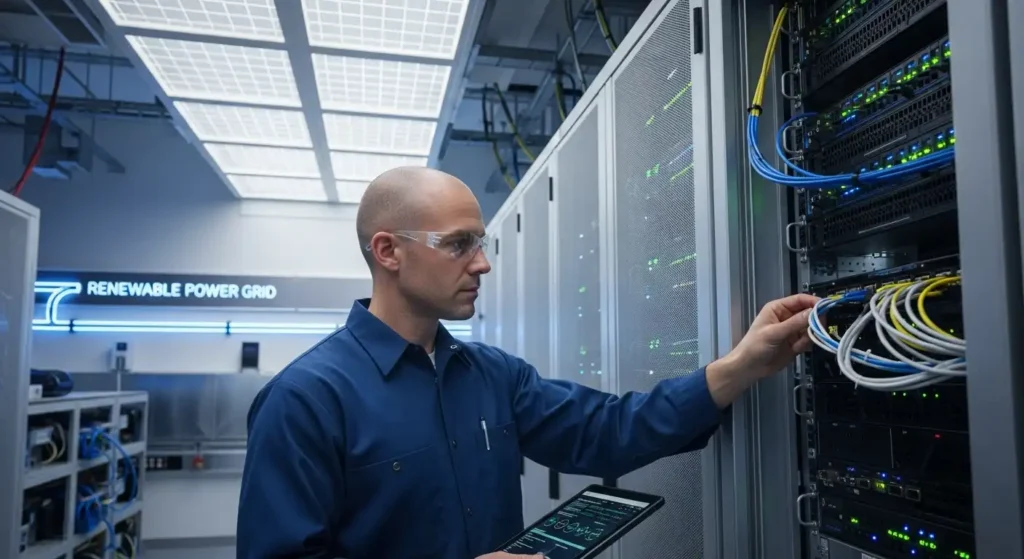This guide explores what eco-friendly hosting really means, why it’s important for your website, and how to choose a provider that’s as committed to the planet as you are.
What Is Green Web Hosting?
 Green web hosting refers to hosting services that reduce their environmental impact by using renewable energy or carbon-offset programs. Traditional hosting companies rely heavily on fossil fuels to power their servers and cooling systems, while eco-friendly hosts aim to minimize or neutralize their emissions.
Green web hosting refers to hosting services that reduce their environmental impact by using renewable energy or carbon-offset programs. Traditional hosting companies rely heavily on fossil fuels to power their servers and cooling systems, while eco-friendly hosts aim to minimize or neutralize their emissions.
Here are some of the most common ways hosting companies go green:
- Renewable energy: Powering servers with wind, solar, or hydroelectric energy.
- Energy-efficient hardware: Using NVMe SSDs and optimized cooling systems to reduce power draw.
- Carbon offsets: Investing in reforestation or renewable energy projects to balance out emissions.
- Virtualization: Hosting multiple virtual servers on one physical machine to save energy.
- Green certifications: Partnering with verified renewable energy programs or achieving certifications like EPA Green Power Partner.
According to Statista, data centers account for over 2% of the world’s total electricity usage. As the number of websites and digital services grows, that figure could double by 2030 — unless companies start shifting to greener technologies.
Why Green Hosting Matters in 2025
The shift toward sustainability isn’t just a marketing buzzword. It’s a reflection of changing values among consumers and companies alike. Here’s why this movement is gaining traction:
1. Environmental Impact
Each website visit consumes energy. For popular sites that receive thousands of visitors a day, that impact adds up quickly. Green hosting helps cut emissions and supports renewable energy infrastructure. Every eco-friendly site contributes to lowering the internet’s carbon footprint.
2. Brand Image and Consumer Trust
Consumers are becoming more aware of the environmental impact of the companies they support. When your business chooses green web hosting, it sends a clear message: you care about sustainability. That can enhance your reputation, strengthen trust, and attract eco-conscious customers.
3. Technological Performance
Eco-friendly hosting doesn’t mean compromising on performance. Many green hosts invest in cutting-edge hardware like NVMe SSDs and optimized cooling systems. These improvements often result in faster website loading times, higher reliability, and lower latency — all of which are great for SEO and user experience.
4. Long-Term Cost Efficiency
While some green hosting services may seem slightly more expensive at first, they often save money over time. Energy-efficient infrastructure reduces overhead costs, and providers pass those savings to customers. Plus, as renewable energy becomes cheaper, green hosts gain a long-term financial advantage.
5. SEO and Search Engine Trends
Search engines like Google are emphasizing environmental responsibility in their corporate goals. While it’s not yet an official ranking factor, green hosting aligns with Google’s sustainability initiatives — and having a faster, optimized site can indirectly boost your SEO results.
How to Choose an Eco-Friendly Hosting Provider
Not all hosts that call themselves “green” actually are. Some engage in greenwashing — marketing themselves as eco-friendly without meaningful action. Here’s what to look for when choosing a trustworthy provider:
- Renewable energy usage: Confirm whether the host uses 100% renewable energy or purchases carbon offsets.
- Energy certifications: Look for affiliations with programs like Green-e or ISO 50001.
- Efficient infrastructure: NVMe storage, modern cooling, and virtualization technology are must-haves.
- Transparency: Reputable companies publish annual sustainability or energy reports.
- Customer support and uptime: Ensure eco-efficiency doesn’t compromise reliability or technical support.
Before switching providers, evaluate your website’s needs and compare plans carefully. The best eco-friendly hosting should balance performance, transparency, and environmental responsibility.
How to Make Your Website Greener (Even Without Changing Hosts)
If you’re not ready to migrate yet, there are still practical steps to make your current site more sustainable:

- Optimize your media files. Compress images and videos to reduce server load.
- Enable caching. Use caching plugins to serve static content more efficiently.
- Minimize HTTP requests. Combine scripts and stylesheets where possible.
- Use a CDN (Content Delivery Network). CDNs reduce energy consumption by serving content from the nearest node.
- Clean up your plugins and database. Remove outdated or unnecessary items that waste resources.
Each of these actions not only improves sustainability but also enhances website performance — a win-win for your visitors and the planet.
Pros and Cons of Green Web Hosting
| Pros | Cons |
|---|---|
| Reduced carbon footprint | May cost slightly more per month |
| Positive brand reputation | Some providers make unverifiable claims |
| High-efficiency hardware and fast performance | Limited options in certain regions |
| Long-term sustainability advantage | Initial setup or migration effort |
Frequently Asked Questions (FAQs)
1. Is green hosting slower than traditional hosting?
No. Most green hosting companies use modern hardware, renewable power, and optimized cooling systems that deliver the same — or better — performance as traditional hosts.
2. How can I verify that a host is truly eco-friendly?
Check for official energy certifications, carbon offset reports, or sustainability partnerships. Transparency is key — reputable companies publish annual energy data and initiatives.
3. Is green hosting worth it for small websites?
Yes. Even small websites can make a meaningful difference. Supporting green hosting providers encourages the industry to move toward renewable energy and sustainability standards.
Final Thoughts
The internet’s environmental impact is real — but so is our ability to reduce it. Choosing a green web hosting provider is a simple yet powerful step toward a more sustainable online ecosystem. Whether you run a small blog or an e-commerce store, aligning your digital presence with environmental responsibility sets you apart as a conscious, forward-thinking brand.
Start evaluating your current provider today. If they don’t meet green standards, consider migrating to one that does. By combining performance with purpose, you can make your website faster, cleaner, and better for the planet.
Related Articles:

